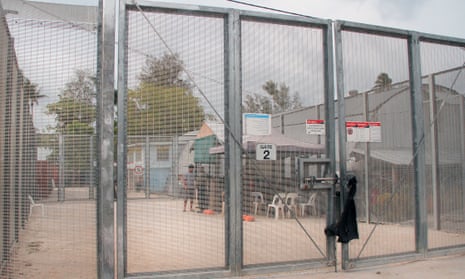The federal government has defended its record on cooperation with the UN after the special rapporteur on the human rights of migrants, François Crépeau, cancelled a trip to Australia over fears that detention centre workers would face reprisals from the visit.
Crépeau was due to tour onshore and offshore detention facilities this week but scrapped the planned visit after learning that detention centre workers could be jailed for two years for speaking to him under the Border Force Act.
The attorney general, George Brandis, admitted that the new law did include “some prohibitions in relation to communicating with third parties” but defended Australia’s record.
“Australia does cooperate with the UN in relation to our human rights obligations,” he told the ABC’s Insiders program on Sunday. “We are in very regular dialogue with relevant UN agencies who do a periodic audit of compliance by all the member states with human rights obligations and we have undertaken that exercise in my department quite recently.”
The shadow foreign minister, Tanya Plibersek, was scathing of the government for failing to reassure Crépeau that people who cooperated with his fact-finding mission would be protected.
“Of course Australia should give the special rapporteur an assurance that no one speaking to the special rapporteur would be subject to prosecution,” Plibersek told ABC TV. “We need to be careful with the personal details of refugees or asylum seekers in detention but the idea that people couldn’t confidently inform the special rapporteur of what is going on is ridiculous.”
The Border Force Act, which became law in May this year, criminalises the disclosure of “protected information” relating to detention centres. Staff who reveal rights abuses could face up to two years in jail.
Crépeau has written to the government to seek assurances that anyone who speaks to him will not have to fear jail time. “This threat of reprisals with persons who would want to cooperate with me on the occasion of this official visit is unacceptable,” he said.
“The act prevents me from fully and freely carrying out my duties during the visit, as required by the UN guidelines for independent experts carrying out their country visits.”
“Since March 2015, I have repeatedly requested that the Australian government facilitate my access to its offshore processing centres. I was also extremely disappointed that I was unable to secure the cooperation needed to visit any offshore centre, given the international human rights and humanitarian law concerns regarding them, plus the Australian Senate inquiries on the offshore detention centres in Nauru and Papua New Guinea, which raised concerns and recommendations concerning these centres.”
A spokesman for the immigration minister, Peter Dutton, told Guardian Australia on Saturday that Crépeau’s response was “disappointing and unfortunate” but that the government would help in facilitating any future visits.
The Greens spokeswoman on immigration, Sarah Hanson-Young, took to Twitter to ask the prime minister, Malcolm Turnbull to grant access to the centres.
“You can’t seriously block the UN from free & unfettered access to Aust refugee detention camps? Come on, open the doors,” she urged him. “You’ve got to wonder what the govt is so worried about keeping hidden.... Must be pretty bad inside these camps.”

Comments (…)
Sign in or create your Guardian account to join the discussion